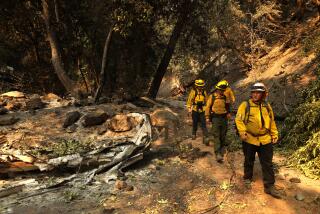Region’s Farmers Weathering Cold Spell--Though It Isn’t Easy
- Share via
Southern California’s farmers watched their thermometers late Wednesday as temperatures threatened to drop below freezing for the second consecutive night, endangering sensitive crops such as strawberries and avocados.
“So far, no one has reported any major damage,” Rick Lefeuvre, Orange County’s agricultural commissioner, said Wednesday afternoon.
“Strawberry farmers are pretty sophisticated, and they watch the temperatures like a hawk.”
The same appeared to be true in agriculture-rich Ventura County.
The farmers there dodged a bullet Tuesday night, said Earl McPhail, Ventura County’s agricultural commissioner. “Everybody I know came through this real well.”
That’s not to say it was easy.
After only a few hours of sleep, Santa Paula citrus and avocado rancher Bob Pinkerton was up at 10 p.m. Tuesday, responding to an alarm planted in one of his orchards warning that the temperature had dropped to 34 degrees.
He had spent Tuesday afternoon running sprinklers in his groves, a frost-protection measure that can raise the temperature by as much as 4 degrees. That night, he had to hop out of bed to fire up his 15 wind machines, a move aimed at circulating the warmer air aloft and directing it closer to the ground.
“When that alarm rings, you go,” he said. “There’s no pulling the covers back over your head.”
Pinkerton was up all night. As the wind machines buzzed overhead like a squadron of helicopters, the veteran rancher monitored a series of thermometers staked in strategic locations throughout his orchard.
The temperature would have to drop to 28 degrees or below, for at least a couple of hours, to cause significant crop damage, Pinkerton explained. It did drop to 28 degrees once during the night, but for less than half an hour.
Overnight temperatures in some areas of Orange County fell even lower. Late Tuesday night, thermometers dipped to 26 degrees in some agricultural districts, the county’s lowest in several years.
Growers there also used sprinklers to protect their crops, which limited losses Tuesday night to about 30% of the crop on 10 to 20 acres, Lefeuvre said--damage he described as negligible.
But field hands were back again Wednesday night in case it got cold again before dawn today.
“The cold could last another two days and maybe into early next week,” Lefeuvre said.
“It’s probably the coldest we’ve had in the last five or six years,” said Doug Circle, owner of Sunrise Growers of Placentia.
While the low temperatures have caused “a big amount of damage” to the February crop, he said, the cold probably affected less than 5% of the total. The main economic drain, Circle said, was the cost of people working overtime to monitor the weather, the cost of water for the sprinkler systems and the disruption to the harvesting cycle.
“We’re not going to pick much today, because the fields are wet, and we’re probably not going to pick much for the next two days,” he said. “It will be a while before we get back to our normal cycle.”
Still, he said, “we’ll get through it, because we’re prepared to live with the weather. It’s all part of farming.”


